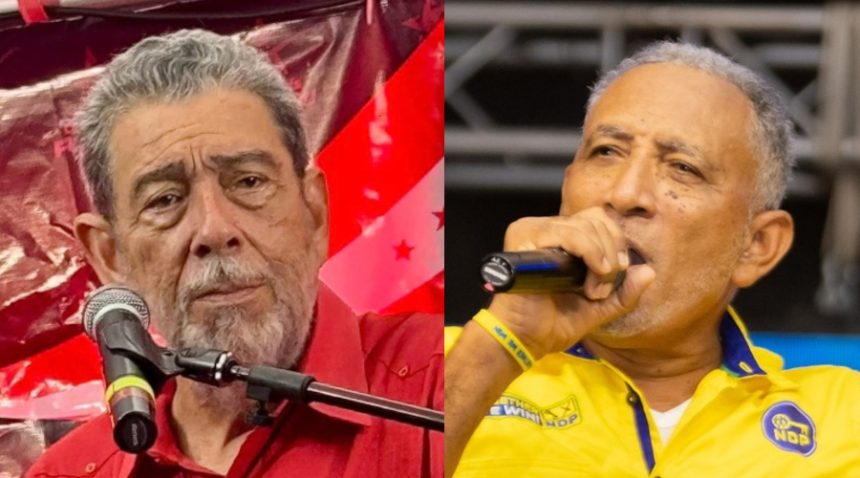(ULP) Holds Narrow Lead Over (NDP), According to National new Survey
The upcoming November 27, 2025 General Elections in Saint Vincent and the Grenadines (SVG) are shaping up to be among the most competitive in the country’s modern history. According to the latest psephological survey conducted by Dunn Pierre Barnett & Company Canada Ltd. (DPBA) and led by Dr. C. Justine Pierre, the Unity Labour Party (ULP) maintains a slim but statistically significant lead over the New Democratic Party (NDP).
DPBA, which has accurately predicted the last several recent Caribbean elections, including the National Democratic Congress victory in Grenada (2022), the UNC win in Trinidad and Tobago (April 2025), the Guyana elections (September 2025), and the Suriname and Jamaica results (2025) has reinforced its reputation as one of the region’s most trusted psephological research organizations.
The DPBA National Voter Perception Survey, conducted between October 1 and 30, 2025, gathered responses from 2,402 Vincentians across all 15 constituencies. Using demographic modeling, historical voting data, and Markov Chain Transition simulations, the analysis projects that the ULP is likely to secure 8 ± 1 seats, while the NDP is expected to win 7 ± 1 seats.
“These findings point to a finely balanced political environment,” said Dr. Pierre. “A one-point shift in national voter satisfaction could determine which party forms the next government.”
The survey found that public satisfaction currently averages 5.49 out of 10, suggesting a cautiously positive but fragile incumbency advantage for the ULP, led by Prime Minister Dr. Ralph E. Gonsalves. Although the party benefits from sustained goodwill after more than and a half decades in power, voter volatility remains high. DPBA’s simulations confirm that even minor fluctuations in satisfaction could shift parliamentary control.
The psephological analysis also highlights clear demographic and geographic divisions in voter preferences. Women remain more supportive of the ULP, while men tend to favor the NDP. Younger voters (ages 18–34), particularly those unemployed or underemployed, express the greatest appetite for political change, while older voters (45–64 and 65+) demonstrate stronger loyalty to the ruling party. Urban voters, especially in Kingstown, show lower satisfaction levels, while rural communities remain more favorable to the government.
Overall, the ULP’s base is strongest among women, rural residents, and older citizens, whereas the NDP’s momentum is concentrated among men, youth, and urban professionals seeking economic renewal and new leadership.
Currently, the ULP commands 51–52% national support, with its strongest performances in North Windward, Marriaqua, and South Windward. Among women who identify with the ULP, 62% rate Prime Minister Gonsalves’ performance at six or higher, compared to 48% of men, underscoring a clear gender-based incumbency advantage. Meanwhile, the NDP continues to expand among younger and urban voters, particularly in East and West Kingstown, the Leeward constituencies, and the Grenadines. Growing concerns about job scarcity, inflation, and the cost of living continue to drive support for the opposition.
Civic engagement is also on the rise. The share of citizens who do not plan to vote has dropped from 18% in 2020 to 12% in 2025, marking a 33% improvement. The most significant increase is observed among women aged 25–44, whose non-voting rate fell from 19% to 10%. This trend is attributed to social media activism, diaspora involvement, and issue-based campaigning.
Economically, the study finds that performance and perception of the economy remain the strongest predictors of voter behavior. The youth unemployment rate, estimated at 27%, continues to shape discontent despite moderate growth averaging 2.3% annually between 2020 and 2024. With inflation averaging 5.8%, rising living costs are a key source of frustration for many voters. According to DPBA’s Markov modeling, improved optimism about infrastructure projects, including roads, hospitals, and port expansions could raise the ULP’s projection to 9–6, while worsening economic sentiment could enable the NDP to gain marginal constituencies and potentially form a minority government.
For the ULP, maintaining voter satisfaction above 5.5 out of 10 is critical. The party’s success depends on curbing inflation, expanding youth employment, accelerating infrastructure delivery, and promoting women’s empowerment and family-oriented policies. For the NDP, victory hinges on mobilizing urban men, professionals, and first-time voters by focusing on economic renewal, cost-of-living relief, leadership renewal, and accountability. A 5% swing among urban voters could be enough to flip two ULP-held constituencies.
DPBA’s probabilistic forecast indicates that the Unity Labour Party (ULP) retains a 64% probability of remaining in power, while the New Democratic Party (NDP) holds a 33% chance of forming the next government.
At the constituency level, North Central Windward (78%), North Windward (73%), and Marriaqua (72%) show the highest confidence levels of victory for the ULP, whereas the Northern Grenadines (72%) and Southern Grenadines (69%) reflect the strongest likelihood of success for the NDP.
“Women remain the statistical foundation of the ULP’s stability,” said Dr. Pierre. “Meanwhile, the NDP’s path to power lies in mobilizing younger, economically frustrated voters who want change.”
In a data-defined democracy such as Saint Vincent and the Grenadines, even small shifts in public sentiment can determine the nation’s political future.


